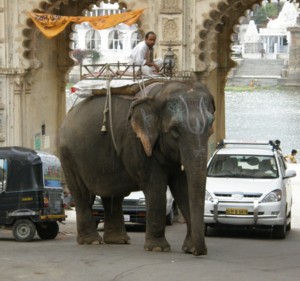October 2009
In summary
India was amazing. It was just as I had been told, read, seen on TV and so on but quite different to what I expected; a physical experience (noise, reactions of and interactions with people, smells and other sensations) rather than an intellectual appreciation.
In the street in Udaipur
I've been all over Europe, N America, the UAE, China, Morocco, Turkey, Malta, NZ, PNG and various pacific islands but of these only Morocco is remotely like India in terms of poverty (over 20%), population growth (largest country in the world within 20 years – and already so by a good margin if you take in pre 1947 India) terrible treatment of women (in some areas and castes) and environmental destruction.
The main differences are that while the environment is even more degraded, Morocco lacks cows and deliberately (uniformly) maimed beggars; and is cleaner, more honest with strangers and better organised - due to Islam? In Rajasthan, where you still hear 'the call to prayer'. India is perceptibly better organised (but not much cleaner).
In the Souk Marrakech Morocco
Unlike Morocco, where the food (even from street stalls) is excellent; the common person India has possibly the worst food in the world - only chicken or 'mutton' or vegetable stew (that all look much the same) and rice - covered by the excessive use of chilli and 'curry' (whatever that contains). As I am quite allergic to chilli I had to be very careful and thus largely avoided the ‘delhi belly’ suffered by others. But there are fresh fruit and vegetables (not bad) for those who can afford them and commercial drinks and confectionery and cigarettes are very cheap.
Most hotels for the higher castes and tourists have a good continental breakfast and a reasonable and relatively inexpensive restaurant serving westernised dishes, so I didn’t starve.
A few international restaurants can be found in Mumbai or New Delhi (eg serving venison, duck, lobster, quail, shellfish, edible fish etc) but then you pay much the same price as here for the food; and a lot more for the wine. These are not for the average Indian. We had my birthday dinner at Indigo (duck, quail and even beef!); very nice but expensive.
There are also a few physical places and districts more or less reserved for the Indian upper classes, business or government (like parts of Mumbai, New Delhi and Shimla) where the public spaces are relatively clean and well run - if a little shabby up close (Katoombaesque) where the Indian food is either less (or more?) authentic; but edible.
Except for recent concrete and glass constructions in business areas (commercial offices and hotels) and infrastructure in economic growth areas (like the Delhi Metro and airports) most substantial structures (public buildings, palaces, forts, monuments etc) are generally left over from the Raj or even the Moguls (like the Taj Mahal) and now sometimes a little worse for wear.
You know where
Yet on the whole, and throughout, I found India enormously stimulating.

